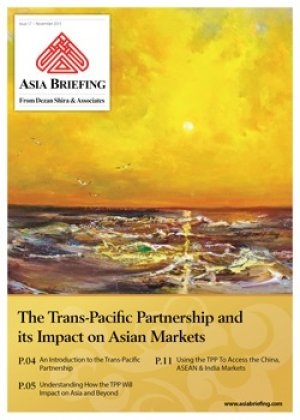ASEAN Market Watch: Malaysia Hiring, Indonesia Retail, and Philippines VAT Waiver
Malaysia: Hiring in manufacturing sector improves
Malaysia’s manufacturing sector continued to register growth despite a 47.2 Purchasing Managers’ Index (PMI) reading in November, which is a little lower than September’s reading of 48.6. A score of 50 indicates improvement in the sector. The Department of Statistics (DoS) in mid-November issued an Industrial Production Index (IPI) showing industrial growth of 3.2 percent year-on-year, mainly from manufacturing and electrical sectors. Sub-sectors such as petroleum, chemical, rubber, plastic products, electrical and electronic products, non-metallic mineral products, and basic metal and fabricated metal products drove growth.
Manufacturing sales also improved to US$13 billion, a 1.1 percent year-on-year expansion. The Monster Employment Index (MEI), which records online hiring, stated that manufacturing was the top growth industry, with online recruitment in that sector expanding by 1 percent year-on-year in August. Local recruits also expect hiring to pick up in the short to medium term, with manufacturing a key sector to benefit the most. In addition to manufacturing, robust growth is also expected in IT and retail industries.
![]() RELATED: Pre Investment and Market Entry Advisory from Dezan Shira & Associates
RELATED: Pre Investment and Market Entry Advisory from Dezan Shira & Associates
Indonesia: Retail sector to continue in the fast lane
A recent World Bank report stated that Indonesia’s retail sector is expected to continue to grow through the year-end and into 2017 due to steady economic growth, rising disposable income levels, and cheaper credit. In addition, moderate inflation, reduced energy prices, and a stable currency, combined with a higher non-taxable income and additional monthly salaries for public servants, should help the sector further. This is also expected to benefit the country’s GDP, which is projected to grow by 5.1 percent this year.
The retail sector has also been undergoing a transformation in the past decade. While small shops were popular during this period, modern retail establishments have made their presence felt, particularly in urban areas. These supermarkets and mini-marts overtook traditional shops for the first time in 2015. Hypermarkets are yet to make a significant impact as compared to supermarkets, though they have had growth. This is due to several issues, including lack of an economically viable space in commercial areas and the presence of convenience stores offering products at comparable prices. Nevertheless, a huge domestic population, paired with a growing middle class with more liberal government reforms, bode well for the sector.
![]() RELATED: Threading the Needle: the Rise of Myanmar as a Garment Manufacturing Alternative
RELATED: Threading the Needle: the Rise of Myanmar as a Garment Manufacturing Alternative
Philippines: Government waives off VAT for the differently abled
The Philippines government approved an act which allows for a 20 percent value added tax (VAT) discount for differently abled persons. The discount will apply to several services, including accommodation, restaurants, recreation centers, medicines, special foods, medical and dental services, diagnostic and laboratory fees, professional fees of doctors, domestic air, sea and land travel, as well as funeral and burial services. The developments are part of a comprehensive tax reform plan aimed to fund increased spending on infrastructure and welfare.
The plan is supported by the Mindanao Business Council. Relatives that take care of differently abled persons are also entitled to a US$500 (PHP 25,000) annual income tax deduction under the new act. As per the act, the definition of differently abled people includes those with long-term physical, mental, intellectual, or sensory impairment which may hinder their full and effective participation in society on an equal basis.
|
Asia Briefing Ltd. is a subsidiary of Dezan Shira & Associates. Dezan Shira is a specialist foreign direct investment practice, providing corporate establishment, business advisory, tax advisory and compliance, accounting, payroll, due diligence and financial review services to multinationals investing in China, Hong Kong, India, Vietnam, Singapore and the rest of ASEAN. For further information, please email asean@dezshira.com or visit www.dezshira.com. Stay up to date with the latest business and investment trends in Asia by subscribing to our complimentary update service featuring news, commentary and regulatory insight. |
Annual Audit and Compliance in ASEAN
For the first issue of our ASEAN Briefing Magazine, we look at the different audit and compliance regulations of five of the main economies in ASEAN. We firstly focus on the accounting standards, filing processes, and requirements for Indonesia, Malaysia, Thailand and the Philippines. We then provide similar information on Singapore, and offer a closer examination of the city-state’s generous audit exemptions for small-and-medium sized enterprises.
 The Trans-Pacific Partnership and its Impact on Asian Markets
The Trans-Pacific Partnership and its Impact on Asian Markets
The United States backed Trans-Pacific Partnership Agreement (TPP) includes six Asian economies – Australia, Brunei, Japan, Malaysia, Singapore and Vietnam, while Indonesia has expressed a keen willingness to join. However, the agreement’s potential impact will affect many others, not least of all China. In this issue of Asia Briefing magazine, we examine where the TPP agreement stands right now, look at the potential impact of the participating nations, as well as examine how it will affect Asian economies that have not been included.
 An Introduction to Tax Treaties Throughout Asia
An Introduction to Tax Treaties Throughout Asia
In this issue of Asia Briefing Magazine, we take a look at the various types of trade and tax treaties that exist between Asian nations. These include bilateral investment treaties, double tax treaties and free trade agreements – all of which directly affect businesses operating in Asia.










